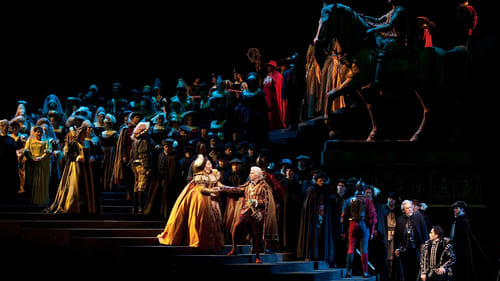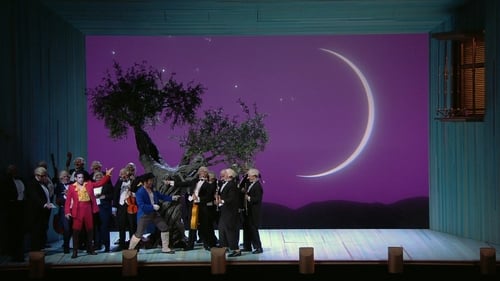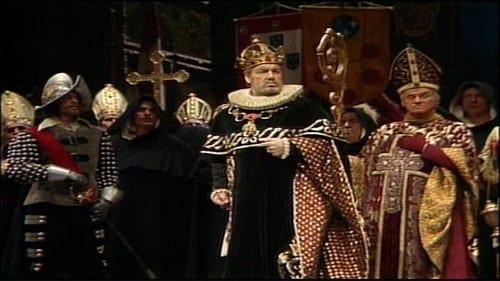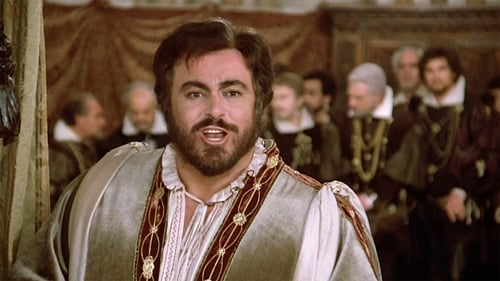Ferruccio Furlanetto
Рождение : 1949-05-16, Sacile, Friuli-Venezia Giulia, Italy
История
Ferruccio Furlanetto was born on May 16, 1949 in Sacile, Friuli-Venezia Giulia, Italy. He is an actor, known for La traviata (1982), Giuseppe Verdi: Don Carlos (1986) and La Gioconda (1979).

Padre Guardiano
Verdi's sweepingly ambitious opera on war, religion, love and fate is given a cinematic staging by Christof Loy. The Marquis of Calatrava forbids his daughter Leonora to marry the South American nobleman Don Alvaro. The lovers attempt to elope, but the Marquis catches them. In the ensuing altercation, Alvaro accidentally kills the Marquis, who curses his daughter as he dies. Leonora and Alvaro become separated during their escape. Leonora's brother Don Carlo di Vargas decides to find them and avenge his father.

Basilio

Don Ruy Gómez de Silva
Rising Met star Angela Meade is Elvira, the young woman caught between three men: her lover, the nobleman-turned-outlaw Ernani (Marcello Giordani); her guardian, the rich, elderly de Silva, who wants her for himself (Ferruccio Furlanetto); and Don Carlo, the King of Spain, who also desires Elvira (Dmitri Hvorostovsky). Verdi’s early drama is full of sweeping melody and rousing rhythms, delivered masterfully by the Met Orchestra and Chorus conducted by Marco Armiliato.

Banco
Recorded at the Paris Opera and co-produced with Siberia’s Novosibirsk Opera, this new Macbeth uses cutting-edge multimedia technology to give the viewer a fresh perspective on the work. Google Earth satellite images plunge us into the heart of the action: a gloomy square surrounded by soulless buildings, and the interior of an aristocratic residence.

Philip II - King of Spain
Family jealousy, threat of rebellion, political back-stabbing and the Inquisition weigh heavy on the court of King Phillip II. The tension finally ignites at the King's coronation, where a number of heretics are to be burnt at the stake.

Jacopo Fiesco-Andrea
Coming just before the mature final works, Verdi's Simon Boccanegra - along with Un Ballo in Maschera, Les Vêpres Siciliennes, La Forza del Destino and Don Carlos - occupy a strange but fascinating hinterland in the career of the composer. Each of the operas, influenced by Verdi's political involvement in the Risorgimento for the reunification of Italy during the period, are very much concerned with the exercise of power, but they all rely on typically operatic conventions of bel canto and French Grand Opéra in their use of personal tragedies and unlikely twists of fate to highlight the human feelings and weaknesses that lie behind their historical dramas. Written in 1859, but revised by the composer in 1881, Piave's libretto given an uncredited reworking by Arrigo Boito, Simon Boccanegra is consequently one of the more interesting works from this period, certainly from a musical standpoint. Live from Teatro all Scala, Milan 2010.

Fillippo II
Giuseppe Verdi : Don Carlo

Basilio
23-year-old Gioachino Rossini completed his masterpiece IL BARBIERE DI SIVIGLIA incredibly quickly – legend has it in just 13 days – which Rossini attributed to ‘facility and lots of instinct’. The opera, characterized by youthful energy and bold wit, has all the ingredients for comic chaos: an imprisoned young woman, her lecherous guardian and a young noble suitor. Skilfully plotting behind the scenes is Figaro, an irrepressible and inventive character in whom many have seen a resemblance to the young Rossini himself. The score fizzes with musical brilliance, from Figaro’s famous entrance aria to the frenzy of the Act I finale. This recording sees Joyce DiDonato (Rosina) bring literal meaning to the old theatrical motto Break a leg! She did just that in an earlier show but was determined to finish her commitment and was re-staged into the production to allow for the additional challenges that come when a leading lady in a lively physical role must wheel around the other performers...

Banquo
Verdi's Macbeth performed by Opéra National de Paris

Starring Ferruccio Furlanetto, Giuseppe Filianoti & Dimitra Theodossiou. From Teatro Massimo, Palermo, Sicily

Filippo II
Rolando Villazón Triumphantly Returns To The Stage As Don Carlo In The 2007/2008 Royal Opera House'S Producton Of Don Carlo. National Theatre director Nicholas Hytner's new staging of Verdi's grandest-- and arguably greatest -- opera, Don Carlo, was the highlight of the 2007/2008 Royal Opera House season. This new production marked Rolando Villazón's much anticipated and triumphant return. Set amidst the political, religious and sexual intrigue of the 16th century Spanish court, this epic work tells the tragic story of Don Carlo, a virtuous young prince who is pitted against the powers of a dominant, corrupt society. First staged at The Royal Opera House in 1886, this new production is the first new version of the 5-Act complete opera to be staged at Covent Garden in 50 years. With sets and costumes by Bob Crowley, direction by Nicholas Hytner, and an enviable cast, this production of Don Carlo is worthy of the greatness of Verdi's original, masterful work.

Prince Gremin
The Wiener Philharmoniker mounts, and Andrea Breth stages, this 2007 production of Pyotr Illych Tchaikovsky's opera Eugene Onegin, starring Peter Mattei, Joseph Kaiser, Anna Samuil and Renée Morloc. The Konzertvereinigung Wiener Staatsopernchor lends added musical accompaniment, under the baton of Daniel Barenboim.

Jacopo Fiesco
One of the lesser known works by Giuseppe Verdi, Simon Boccanegra is regarded by most opera lovers as one of his finest. The action takes place in the 14th century and deals with the political and personal rivalry between the corsair Simon Boccanegra, who has been elected Doge of Genoa with the help of the plebeian vote, and the local nobleman, Jacopo Fiesco. Arthaus presents a visually alert, musically sensitive and disturbingly coherent (Der Standard) production of the piece on DVD. The staging was directed by one of the giants of the European theatre, Peter Stein. His fondness for atmospherically dense spaces in which the characters can fully develop is particularly well brought out in his Vienna production, not least because he had at his disposal two remarkable singing actors for the principal male roles, Thomas Hampson and Ferruccio Furlanetto.

Leporello
Live performance at the Metropolitan Opera in 2000.

Himself
This tribute to James Levine, first shown on PBS, was only part of that glorious evening. Here we have the whole performance, up to three hours. I could not stop watching these discs. Let me say this much; Levine has done for the Met, making it the premier opera house in the world, what Karajan did with the Berlin, making it one of the finest orchestras ever. So sit back and enjoy.

Self(Don Giovanni)
A look at the entire process of creating and developing Patrice Chéreau’s third staging of "In the Solitude of Cotton Fields" by Bernard Marie Koltès with Pascal Greggory and Chéreau himself. From the first reading around the table through the first contact with the performance space, rehearsals and lighting to opening night, the entire creative process unfurls in front of our eyes. The film shows us the evolving and ongoing dialogue between Greggory and Chéreau, a dialogue full of crises and magical moments of harmony and insight via which the truth, intensity, complexity, mystery and depth of Koltès’ text gradually emerge to form an implicit bond between these two men. The film also shows Chéreau directing rehearsals for Mozart’s "Don Giovanni" in Salzburg, revealing both the unity of and profound differences between his opera and theater work.

Don Pasquale

Leporello
Live performance from Cologne Opera. Conlon conducts a skittishly dynamic performance of Don Giovanni. He relies on Thomas Allen’s tough Don to give the work much of its dark menace and on Holle’s terrifying Commendatore to provide the moral outrage – his job is to keep things moving, and he does. The exteriors – blank city spaces reminiscent of the paintings of Giorgio De Chirico – and moodily claustrophobic interiors mirror effectively the anguish of the orphaned Anna and the abandoned Elvira; this is a performance in which the two women victims of the Don function effectively as correctives to his libertine charm. Andrea Rost as Zerlina brings real delicacy to her role, reminding us that “La ci darem la mano” is a duet about her flirtation with Don Giovanni and not just a famous stand-alone moment. This is an admirable presentation of a fine performance.

Leporello
Every woman wants him, every man wants to be him: Mozart’s version of the irresistible rogue who brings excitement with him and leaves destruction it his wake has always attracted top singing actors, as in this performance brilliantly led by James Levine. Samuel Ramey is Don Giovanni, pursued by the incandescent Karita Mattila (Donna Elvira) in her Met debut season and role, and by the white-hot avenging fury of Carol Vaness (Donna Anna.) Ferruccio Furlanetto delivers a masterful comic turn as the Don’s servant, Leporello.

Procida
Live from La Scala Jan. 2 1990

Guglielmo
Nikolaus Harnoncourt conducts the Wiener Philharmoniker in this filmed studio performance of Mozart's opera recorded in 1988.

Himself
Opera greats Luciano Pavarotti and Joan Sutherland -- one of the most acclaimed tenors and one of the most beloved sopranos of the 20th century -- take the stage at the Met for a gala evening of opera scenes with special guest Leo Nucci. Filmed in 1987, the memorable program includes scenes from the first and third acts of Donizetti's "Lucia di Lammermoor," the third act of Verdi's "La Traviata" and the third act of Verdi's "Rigoletto."

With its hilarious hijinks and vocal virtuosity, Rossini’s madcap comedy always proves a delightful treat. For this 1988 telecast, the Met assembled a cast capable of tackling both the musical and physical challenges of this bel canto farce, seen here in a whimsical production by John Cox. From the moment he takes the stage with Figaro’s iconic aria “Largo al factotum,” Leo Nucci combines winning charm with a robust baritone. Soprano Kathleen Battle tosses off one glittering vocal display after another as the feisty Rosina, while tenor Rowell Blake makes for an ardent Count Almaviva. Ralf Weikert conducts the lively performance, which also includes the comic duo of Enzo Dara as Dr. Bartolo and Ferruccio Furlanetto as Don Basilio.

Leporello
Live performance from Salzburger Festspiele in 1987. Herbert von Karajan conducting the Wiener Philharmoniker and Wiener Staatsopernchor. Stage director Michael Hampe. Starring Samuel Ramey and Anna Tomowa-Sintow.

Philippe II
A live performance of Giuseppe Verdi's opera.

El Gran Inquisidor
Ghiaurov, Freni, and Bumbry were great voices in their time, and they are still effective here -- good enough musicians to put over the quite heavy vocal and expressive demands of their roles. Louis Quilico was never quite in that league, and he sounds a bit spread and woofy in places here, but he works hard and effectively to bring Rodrigo to life. Placido Domingo recorded his first Don Carlo, for EMI with Giulini, about 15 years before this production, but he looks and sounds fine here -- in the early 1980's he was doing very good Otellos and Lohengrins too, and Furlanetto, still in his 30's, brings a rich, young voice to an old part and succeeds in making the Grand Inquisitor vocally as well as expressively formidable. Levine brings both weight and energy to the score, and that reading fits well with the overall "traditional" design and production -- the Met's wardrobe budget must have been severely taxed, but everybody looks splendid.

Sparafucile
Rigoletto is a jester in the court of the Duke of Mantua. He has a hunch-back and he's rather unattractive, but he's good at his job of humiliating the courtiers for the amusement of the Duke. The courtiers, of course, are not amused. The Duke is a ladies man who feels his life would be meaningless if he couldn't chase every skirt he sees. In fact, we learn as the opera begins that he's recently been noticing a young lady every Sunday on her way to church, and he's vowed to have his way with her. What nobody realizes is that the girl is the jester's beloved daughter, Gilda, and that Gilda has seen the Duke every Sunday and is smitten with him. Suddenly Count Monterone appears at court, furious that the Duke has seduced his daughter. Rigoletto ridicules Monterone, the Duke laughs, and Monterone casts an awful curse on both of them. Later, the courtiers discover that Rigoletto is secretly living with Gilda...

Basilio
Live from Glyndebourne 1981

Rare recording of the 1979 San Francisco performance of La Gioconda by Ponchielli








